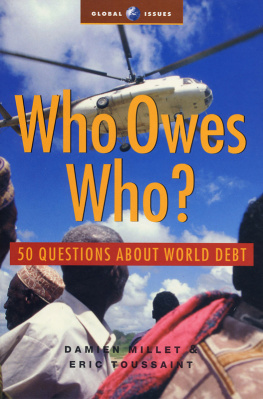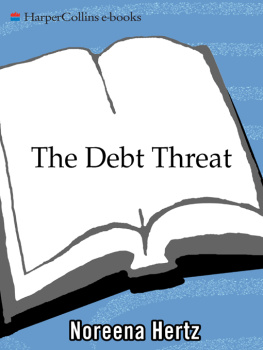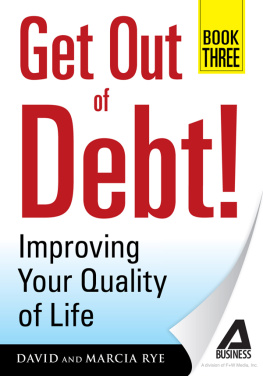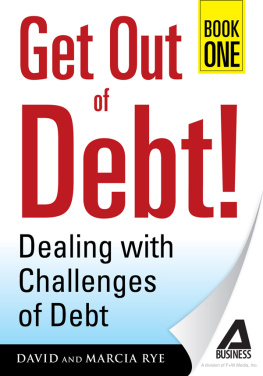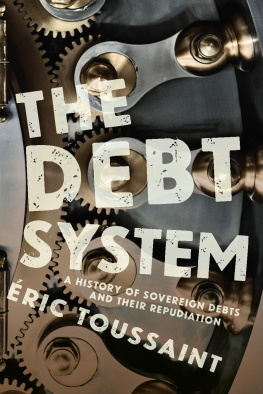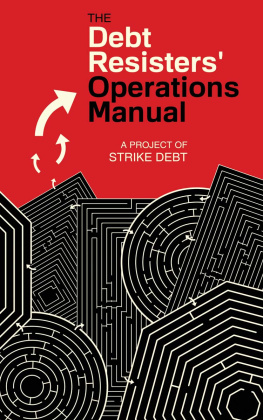
The authors
Damien Millet teaches mathematics to post-A-level classes preparing entrance exams to top Higher Education establishments. He lives in Orlans, and is the General Secretary of CADTM France (Committee for the Abolition of Third World Debt).
Eric Toussaint is a historian and political scientist, President of the CADTM, member of the International Council of the World Social Forum and of the Scientific Advisory Board of ATTAC France. He is the author of Your Money or Your Life! The Tyranny of Global Finance (1999), co-author of Le bateau ivre de la mondialisation. Escales au sein du village plantaire (2000), Afrique: abolir la , Cuba: le pas suspendu de la rvolution (2001) and Sortir de limpasse. Dette et ajustement (2002).
Reading committee
Sylvie Bourinet is a former journalist and an active member of CADTM France.
Denise Comanne is an art historian and prime mover of the CADTM; co-author of Femmes, enfants, face la violence: rsistance du Nord au Sud (1999).
Stphane Desgain works for the Centre National de Coopration au Dveloppement (National Centre for Co-operation and Development), Belgium, and is a member of the organizing committee of ATTAC Belgium.
Damien Elisei is a physics student and a member of CADTM France.
Jean-Marie Harribey is Professor of Economics at the University of Bordeaux, author of La dmence snile du capital (2002) and a member of the Scientific Advisory Board of ATTAC France.
Alain Saumon is a geographer and President of CADTM France.
Patrick Silberstein is a publisher.
Arnaud Zacharie is a researcher for the CADTM, spokesman for and co-ordinator of the scientific network of ATTAC Belgium and the author of several books.
DAMIEN MILLET | ERIC TOUSSAINT
Who owes who?
50 questions about world debt
Translated by Vicki Briault Manus with the collaboration of Gabrielle Roche
University Press Ltd
DHAKA
White Lotus Co. Ltd
BANGKOK
Fernwood Publishing Ltd
NOVA SCOTIA
Books for Change
BANGALORE
SIRD
KUALA LUMPUR
David Philip
CAPE TOWN
Zed Books
LONDON NEW YORK
in association with

Comit pour lAnnulation de
la Dette du Tiers Monde
Who owes who? 50 questions about world debt was first published in 2004 by
in Bangladesh: The University Press Ltd, Red Crescent Building, 114 Motijheel C/A, PO Box 2611, Dhaka 1000
in Burma, Cambodia, Laos, Thailand and Vietnam: White Lotus Co. Ltd, GPO Box 1141, Bangkok 10501, Thailand
in Canada: Fernwood Publishing Ltd, 8422 St Margarets Bay Road (Hwy 3) Site 2a, Box 5, Black Point, Nova Scotia B0J 1B0
in India: Books for Change, 139 Richmond Road, Bangalore 560 025
in Malaysia: Strategic Information Research Development (SIRD), No. 11/4e, Petaling Jaya, 46200 Selangor
in Southern Africa: David Philip (an imprint of New Africa Books), 99 Garfield Road, Claremont 7700, South Africa
in the rest of the world: Zed Books Ltd, 7 Cynthia Street, London N1 9JF, UK and Room 400, 175 Fifth Avenue, New York, NY 10010, USA.
This ebook edition was first published in 2013
www.zedbooks.co.uk
in association with le Comit pour lAnnulation de la Dette du Tiers Monde (CADTM), 345 rue de lObservatoire, 4000 Lige, Belgium
Copyright CADTM, 2004
Translation copyright Vicki Briault Manus, 2004
The rights of Damien Millet and Eric Toussaint to be identified as the authors of this work have been asserted by them in accordance with the Copyright, Designs and Patents Act, 1988.
Cover designed by Andrew Corbett
Set in FF Arnhem and Futura Bold by Ewan Smith, London
A catalogue record for this book is available from the British Library.
US CIP data are available from the Library of Congress.
Caladian CIP data are available from the National Library of Canada
All rights reserved
ISBN 978 1 84813 802 5
Abbreviations
ATTAC | Association for the Taxation of financial Transactions for Aid to Citizens |
DCs | Developing Countries |
FAO | Food and Agriculture Organization (UN organization) |
GATS | General Agreement on Trade in Services |
GDP | Gross Domestic Product |
GMOs | Genetically Modified Organisms |
HIPCs | Heavily Indebted Poor Countries |
IBRD | International Bank for Reconstruction and Development (World Bank group) |
IDA | International Development Association (World Bank group) |
IFIs | International Financial Institutions |
IMF | International Monetary Fund |
LDCs | Least Developed Countries |
NEPAD | New Partnership for African Development |
NGO | Non-Governmental Organization |
OAU | Organization of African Unity (replaced by the African Union in 2002) |
ODA | Official Development Assistance |
OECD | Organization for Economic Co-operation and Development |
OPEC | Organization of Petroleum-Exporting Countries |
PRSP | Poverty Reduction Strategy Paper |
SAP | Structural Adjustment Programme |
SDR | Special Drawing Rights |
TRIPs | Trade-Related Intellectual Property Rights agreement |
UN | United Nations |
UNCTAD | United Nations Conference on Trade and Development |
UNDP | United Nations Development Programme |
USSR | Union of Soviet Socialist Republics |
WHO | World Health Organization |
WTO | World Trade Organization |
Introduction
For the last twenty years, despite their innumerable natural and human resources, the Third World countries have been milked dry. The repayment of a debt which has swollen to colossal proportions prevents the populations from satisfying their most basic needs. The debt has become a subtle mechanism of domination and a new method of colonization, hindering any sustainable human development in the South. The policies applied by the indebted governments are more often decided by the creditors than by the parliaments of the countries concerned. The limits of the so-called debt-reduction initiative, launched with great pomp by the G7, the IMF and the World Bank, were shown up by the largest petition ever known (24 million signatures collected between 1998 and 2000, co-ordinated by the Jubilee 2000 campaigns). A radically different approach needs to be adopted: purely and simply, cancelling the debt, which is immoral and often odious.
The authors provide answers to various objections. Once freed of their external debt, is there not a risk that the countries might fall back into the trap of unsustainable indebtedness? Would debt cancellation not give a second chance to corrupt and dictatorial regimes? Will it not be the tax-payers of the North who end up paying for the cancellation? The authors argue that debt cancellation is necessary but not sufficient, and must be accompanied by other measures such as the recovery of ill-gotten gains and their restitution to the despoiled populations. They suggest alternative sources of finance, both local and international. They also ask: who owes what to whom? They support the demands for reparation put forward by social movements in the South.
Next page
